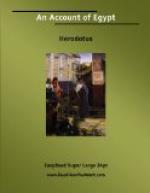Of the Egyptians themselves, those who dwell in the part of Egypt which is sown for crops practise memory more than any other men and are the most learned in history by far of all those of whom I have had experience: and their manner of life is as follows:—For three successive days in each month they purge, hunting after health with emetics and clysters, and they think that all the diseases which exist are produced in men by the food on which they live: for the Egyptians are from other causes also the most healthy of all men next after the Libyans (in my opinion on account of the seasons, because the seasons do not change, for by the changes of things generally, and especially of the seasons, diseases are most apt to be produced in men), and as to their diet, it is as follows:—they eat bread, making loaves of maize, which they call kyllestis, and they use habitually a wine made out of barley, for vines they have not in their land. Of their fish some they dry in the sun and then eat them without cooking, others they eat cured in brine. Of birds they eat quails and ducks and small birds without cooking, after first curing them; and everything else which they have belonging to the class of birds or fishes, except such as have been set apart by them as sacred, they eat roasted or boiled. In the entertainments of the rich among them, when they have finished eating, a man bears round a wooden figure of a dead body in a coffin, made as like the reality as may be both by painting and carving, and measuring about a cubit or two cubits each way; and this he shows to each of those who are drinking together, saying: “When thou lookest upon this, drink and be merry, for thou shalt be such as this when thou art dead.” Thus they do at their carousals. The customs which they practise are derived from their fathers and they do not acquire others in addition; but besides other customary things among them which




